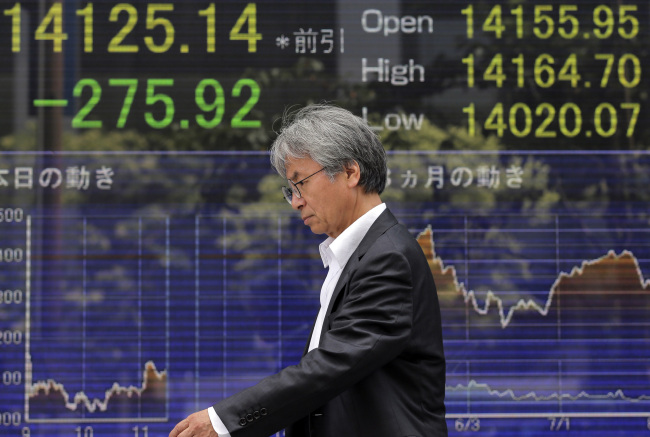 |
A man walks by an electronic stock board in Tokyo on Wednesday. (AP-Yonhap News) |
The Bank of Japan will expand its record easing by June next year as inflation remains distant from its 2 percent target, according to a survey of economists by Bloomberg News.
Twenty of 26 analysts expect more stimulus in the next 10 months, while all said the bank would keep policy on hold at a two-day meeting starting Wednesday. Consumer prices excluding fresh food, the BOJ’s preferred measure of inflation, rose 0.4 percent in June.
Koichi Hamada, a retired Yale University professor who advises Prime Minister Shinzo Abe on monetary policy, said Wednesday that Governor Haruhiko Kuroda should be prepared to add easing if the economy falters after a planned sales-tax increase in April. While the BOJ in July raised its assessment of the economy for a record seventh straight month, the increase in the levy and a slowdown in China, Japan’s largest trading partner, could threaten the revival.
“It’ll be really difficult to achieve 2 percent inflation in two years,” said Takeshi Minami, chief economist at Norinchukin Research Institute Co. in Tokyo. “A sales tax increase will undoubtedly slow the Japanese economy and inflation momentum.”
Economists are split on the timing of the bank’s next easing. Five see stimulus in the October-December period; six in the first quarter of 2014; and nine in the three months through June, the survey showed. Five forecast more accommodative measures in July or later.
“Mr. Kuroda seems to be in favor of the consumption tax hike,” Hamada said in a phone interview from his home in Connecticut, U.S. “In that case, he should be ready to use the strong medicine of monetary policy if the economy falters.”
Kuroda should “accelerate monetary policy” if the economy is precarious or unsteady in the first or second quarters, Hamada said.
Japanese stocks slipped Wednesday as the yen strengthened. The Topix index slid 1.8 percent as of 10:52 a.m. local time, paring this year’s gain to 36 percent. The yen traded at 97.32 per dollar as of 10:55 a.m., up 0.4 percent.
Yuji Shimanaka, chief economist at Mitsubishi UFJ Morgan Stanley Securities Co. in Tokyo, was the only analyst not to forecast any further stimulus. He sees the bank starting to taper its asset purchases from the latter half of fiscal 2015.
The bank last month confirmed a median forecast of board members that prices will rise 1.9 percent in the fiscal year starting April 2015 ― coinciding with the end of its stated two-year time horizon for meeting its target. The projection excludes the effects of a planned two-step sales tax increase in April next year and October 2015.
The bank will add stimulus in the first three months of 2014 as the pace of price gains is slow compared to a BOJ inflation forecast that is too optimistic, said Kiichi Murashima, Citigroup Inc.’s chief economist in Tokyo.
Yasuhide Yajima, chief economist at NLI Research Institute Ltd., predicts BOJ action in the final quarter of 2013 as the nation’s economic outlook is clouded by a decision later this year on the implementation of the sales-tax rise.
International Monetary Fund directors “generally” supported the plan to boost the consumption levy, though “a few” expressed concern over a possible hit to growth, the fund said Aug. 5 in a statement. Kuroda said July 29 that the economy can weather the tax rise.
(Bloomberg)




![[Weekender] Korea's traditional sauce culture gains global recognition](http://res.heraldm.com/phpwas/restmb_idxmake.php?idx=644&simg=/content/image/2024/11/21/20241121050153_0.jpg)



